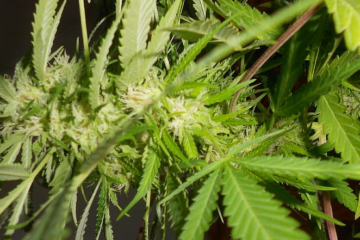Endometriosis is a chronic condition that affects millions of women worldwide. It occurs when tissue similar to the lining of the uterus grows outside the uterus, causing inflammation, pain, and infertility. The current treatments for endometriosis are limited and often have side effects. However, a new study suggests that cannabis may offer a natural and effective alternative for managing endometriosis symptoms.
Cannabis and the Endocannabinoid System
Cannabis is a plant that contains over 100 compounds called cannabinoids, which interact with the endocannabinoid system (ECS) in the human body. The ECS is a network of receptors and molecules that regulate various physiological processes, such as mood, pain, inflammation, and immune response. The ECS also plays a role in the development and function of the reproductive system, including the uterus and the ovaries.
Some studies have shown that women with endometriosis have altered levels of endocannabinoids, which are the natural cannabinoids produced by the body. This may lead to a dysregulation of the ECS and contribute to the pathogenesis and progression of endometriosis. For example, lower levels of anandamide, an endocannabinoid that binds to the CB1 receptor, may result in increased inflammation and pain in endometriosis lesions. Moreover, higher levels of 2-arachidonoylglycerol (2-AG), another endocannabinoid that binds to the CB2 receptor, may promote the growth and survival of endometriotic cells.
Cannabis, on the other hand, may help restore the balance of the ECS and provide relief for endometriosis symptoms. Some of the cannabinoids found in cannabis, such as tetrahydrocannabinol (THC) and cannabidiol (CBD), can mimic the effects of endocannabinoids and modulate the activity of the ECS. For instance, THC can activate the CB1 receptor and reduce pain and inflammation, while CBD can inhibit the enzyme that breaks down anandamide and increase its levels in the body. Additionally, CBD can also interact with other receptors and pathways that are involved in endometriosis, such as the serotonin, opioid, and TRPV1 receptors.
Cannabis and the Gut Microbiota
Another factor that may influence the development and progression of endometriosis is the gut microbiota, which is the community of microorganisms that live in the digestive tract. The gut microbiota can affect the immune system, the hormonal balance, and the inflammatory response of the body. It can also interact with the ECS and modulate its function.

Some studies have found that women with endometriosis have different gut microbiota composition than healthy women. For example, they have lower diversity and richness of beneficial bacteria, such as Lactobacillus and Bifidobacterium, and higher abundance of potentially harmful bacteria, such as Escherichia coli and Prevotella. These changes may result in increased intestinal permeability, bacterial translocation, and systemic inflammation, which may worsen endometriosis symptoms and complications.
Cannabis, however, may help improve the gut microbiota and its interaction with the ECS. Some of the cannabinoids and terpenes in cannabis have antimicrobial, anti-inflammatory, and immunomodulatory properties that can affect the growth and activity of the gut bacteria. For example, CBD can inhibit the growth of E. coli and Prevotella, while THC can increase the production of 2-AG and enhance the protective effects of the ECS on the gut barrier. Furthermore, cannabis may also help alleviate some of the gastrointestinal symptoms that are common in women with endometriosis, such as bloating, constipation, and diarrhea.
Cannabis and Endometriosis: A Promising Option
The study that explored the relationship between cannabis, the ECS, and the gut microbiota in endometriosis was a narrative review that summarized the existing literature on the topic. The authors concluded that both the ECS and the gut microbiota may play important roles in the pathophysiology and symptomatology of endometriosis, and that cannabis may offer a promising option for modulating these factors and improving the quality of life of women with endometriosis. However, they also acknowledged that more clinical trials are needed to confirm the effectiveness and safety of cannabis for endometriosis, as well as to determine the optimal dosage, delivery method, and cannabinoid profile.
Cannabis is a plant that has been used for centuries for various medicinal and recreational purposes. It has also been reported by many women with endometriosis as a self-management strategy for coping with their condition. However, cannabis remains a controversial and illegal substance in many countries, and its use is often stigmatized and criminalized. Therefore, more research and education are needed to raise awareness and support for cannabis as a potential treatment for endometriosis, and to advocate for its legalization and regulation.



